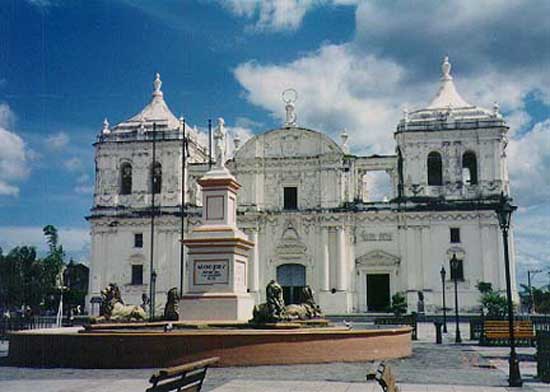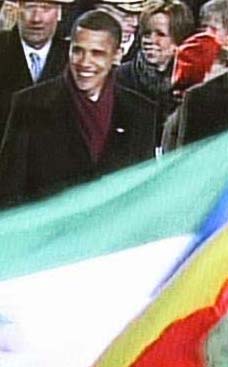
An average day, for me, goes something like this: The first bus goes by at 6:30 am, blaring its horn for all it’s worth. All of the buses here are old, refurbished American school busses. Most are tricked out with luggage racks, a great sound system, and racks on the top for holding people, luggage, bags of agricultural products, and any number of other things. I usually wake up when this bus goes by with its out-of -control horn. I climb out of bed and the mosquito net and go to the latrine, trying not to touch one of the big pigs that lives between my house and the latrine. Afterwards, I go to take my bucket bath. There is an outdoor place for bathing. There is a bucket or two of water and a small bucket. I dip the small bucket into the big one and pour the water over me. Hence the name bucket bath. By then my siblings are up and my sister is brewing coffee and starting the fire. The kitchens in the countryside of Nicaragua are outfitted with wood burning stoves. By the time I am dressed there is a cup of coffee waiting for me and we sit on the porch and have coffee.
PCV Molly Baade writes: A letter home from Nicaragua
A letter home from Nicaragua
Lake Sun Leader
Fri Feb 13, 2009, 05:04 AM CST
Lake of the Ozarks, Mo. -
Molly Baade
newsroom@lakesunonline.com
Greetings from the wilds of Nicaragua! This is Molly Baade of Camdenton, your local Peace Corps Volunteer in Central America.
I live on top of a mountain in the northern department of Madriz, near the Honduran border. From where I am sitting on my porch, I can see two orange trees, several coffee bushes, five eucalyptus trees, and innumerable mango trees.
I can also see chickens running around, a pile of clay tiles that we recently removed from my roof, the closest community water pump, my neighbor’s outdoor shower, their latrine, and the rock where she hand washes her laundry.
I chose to become a Peace Corps Volunteer because, although I have lived, worked, and travelled abroad plenty since graduating from college in 2005, I decided I was ready for more structure to my life.
I applied to graduate school for journalism, and to the Peace Corps. I was in Beijing watching the city come alive with the 2008 Olympic Games when the Peace Corps called and offered me a placement in Nicaragua as an Agriculture Volunteer, starting in September, a mere two weeks later.
Ring of Fire
Nicaragua is known as the “land of lakes and volcanoes,” and, indeed, it forms part of the Ring of Fire and has several active volcanoes. As a result, the soil of Nicaragua is extremely rich. It has an agriculturally based economy and culture.
For such a small country (smaller than Missouri), the land is very diverse. In the lowlands on the Pacific coast there are large farms of rice, millet, corn, and sugar cane. In the northern highlands you find red beans, large tobacco plantations (and some of the finest cigars with seeds coming straight from Cuba), and coffee plantations. The Caribbean coast is largely low marshland and there is not much agriculture on that side of the country.
Nicaragua is poor and has very little infrastructure. Which is why “Costa Rican” coffee and “Cuban” cigars were probably grown here in Nicaragua and exported to Costa Rica and Cuba, and then claimed as products of that country.
Most farmers only have a few acres of land and some livestock. The fields are still largely plowed by bulls or mules and seeds planted by hand. The basics here include beans, rice, and corn tortillas. Thus, the majority of my job as an Agriculture Volunteer is to provide food security.
I teach individual families about their gardens so they can provide vegetables to their families. I teach vermi-culture, or using earthworms in compost for the gardens. I work with school gardens and teaching the youth of Nicaragua how to care about the food that goes into their bodies. I will help the women in my community make jams and wines from the abundance of fresh fruit.
Culture exchange
The other part of my job as a Peace Corps Volunteer is to simply exchange cultures; to share American culture with Nicaraguans and to be a good American ambassador. The conflicts of the 1980’s are still fresh in many people’s minds, so there is still residual resentment toward us gringos among many Nicaraguans. Thus, simply being an American and getting to know people face-to-face is a big part of my work here. And, the flipside, is to tell you all, my fellow Americans, about Nicaragua and my life here.
So what is life like here in northern Nicaragua for a Peace Corps volunteer?
I live with a host family. I have a small room that is attached to the house with my own door to the outside. Our house is mostly made of cement blocks, cement walls and floors, and adobe. The roof is a combination of clay tiles and galvanized metal.
My community is small, about 600 people, and it is very organized. We live at the top of a mountain and there is regular bus service down the mountain and further on to our department capital of Somoto, Madriz.
A day in the life
An average day, for me, goes something like this: The first bus goes by at 6:30 am, blaring its horn for all it’s worth. All of the buses here are old, refurbished American school busses. Most are tricked out with luggage racks, a great sound system, and racks on the top for holding people, luggage, bags of agricultural products, and any number of other things.
I usually wake up when this bus goes by with its out-of -control horn. I climb out of bed and the mosquito net and go to the latrine, trying not to touch one of the big pigs that lives between my house and the latrine.
Afterwards, I go to take my bucket bath. There is an outdoor place for bathing. There is a bucket or two of water and a small bucket. I dip the small bucket into the big one and pour the water over me. Hence the name bucket bath.
By then my siblings are up and my sister is brewing coffee and starting the fire. The kitchens in the countryside of Nicaragua are outfitted with wood burning stoves. By the time I am dressed there is a cup of coffee waiting for me and we sit on the porch and have coffee.
Want water? Haul it yourself
Then it is time to haul water. My community has several public puestos, or spigots where people get their water. We use five-gallon buckets and wait in line with our neighbors for our turn to get water. We haul it back and fill up a small above ground cistern and several other receptacles that hold water, including the buckets in the shower and the cistern next to the lavendero, or the washing rock.
After we haul several trips of water, it’s time for breakfast. Sometimes we eat here, but more often than not we go to the abuela’s house for breakfast. Breakfast usually consists of refried beans with tomato and onion and freshly made tortillas.
After breakfast I return to our house and gather up my laundry from the day before and take it out to the concrete slab where I wash my clothing by hand. I’ve pretty much figured out most of it … except jeans and sheets and other large things, which just make me feel inept.
By this time it’s about 9 a.m. The morning is usually spent cleaning my room, writing on my computer, studying Spanish on my abuela’s porch, or simply reading a book. Sometimes in the mornings I take the bus and go to Somoto, or hike down the mountain and then take a taxi to Somoto. There’s not a lot to the department capital, but there is the post office, several internet cybers, and food that is different from the everyday rice and beans.
In the afternoons I go visit houses and try and communicate in Spanish with people outside of my host family and comfort zone. I talk about their gardens, ask them about the plants they have around their houses, and see if they have Marango trees nearby or if they are practicing vermiculture.
Three afternoons a week, I teach English classes at the community center. My class of kids aged 7-12 is my best class – I really enjoy working with youth.
It starts getting dark around 6 p.m. and most people are sitting on their porches or inside watching the 6 o’clock news.
Nicaraguans are thrilled with President Obama. He gained an even stronger following after vowing to close Gitmo within a year.
After dinner people retire into their homes. My family usually goes to bed between 7-8 p.m. I generally stay up in my room reading books under my mosquito net. I read a lot here.
Peace Corps service is for 27 months.
There are three months of in-country training. In my group’s case, we had a trainer who taught us about agriculture and food security in Nicaragua and we had 6 hours of intensive Spanish classes with an average 3:1 student to professor ratio. After three months of training, volunteers are sworn in and are placed in a community for the next 24 months.













